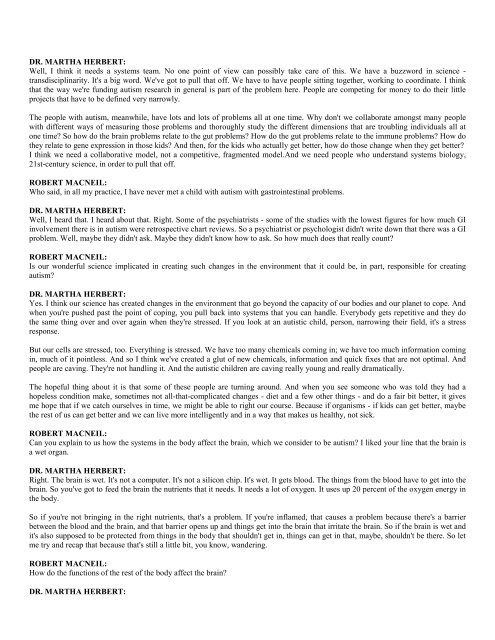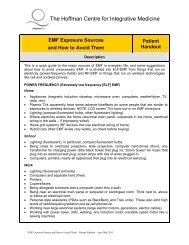PBS NEWSHOUR - Autism Now Interview with Dr. Martha Herbert
PBS NEWSHOUR - Autism Now Interview with Dr. Martha Herbert
PBS NEWSHOUR - Autism Now Interview with Dr. Martha Herbert
Create successful ePaper yourself
Turn your PDF publications into a flip-book with our unique Google optimized e-Paper software.
DR. MARTHA HERBERT:Well, I think it needs a systems team. No one point of view can possibly take care of this. We have a buzzword in science -transdisciplinarity. It's a big word. We've got to pull that off. We have to have people sitting together, working to coordinate. I thinkthat the way we're funding autism research in general is part of the problem here. People are competing for money to do their littleprojects that have to be defined very narrowly.The people <strong>with</strong> autism, meanwhile, have lots and lots of problems all at one time. Why don't we collaborate amongst many people<strong>with</strong> different ways of measuring those problems and thoroughly study the different dimensions that are troubling individuals all atone time? So how do the brain problems relate to the gut problems? How do the gut problems relate to the immune problems? How dothey relate to gene expression in those kids? And then, for the kids who actually get better, how do those change when they get better?I think we need a collaborative model, not a competitive, fragmented model.And we need people who understand systems biology,21st-century science, in order to pull that off.ROBERT MACNEIL:Who said, in all my practice, I have never met a child <strong>with</strong> autism <strong>with</strong> gastrointestinal problems.DR. MARTHA HERBERT:Well, I heard that. I heard about that. Right. Some of the psychiatrists - some of the studies <strong>with</strong> the lowest figures for how much GIinvolvement there is in autism were retrospective chart reviews. So a psychiatrist or psychologist didn't write down that there was a GIproblem. Well, maybe they didn't ask. Maybe they didn't know how to ask. So how much does that really count?ROBERT MACNEIL:Is our wonderful science implicated in creating such changes in the environment that it could be, in part, responsible for creatingautism?DR. MARTHA HERBERT:Yes. I think our science has created changes in the environment that go beyond the capacity of our bodies and our planet to cope. Andwhen you're pushed past the point of coping, you pull back into systems that you can handle. Everybody gets repetitive and they dothe same thing over and over again when they're stressed. If you look at an autistic child, person, narrowing their field, it's a stressresponse.But our cells are stressed, too. Everything is stressed. We have too many chemicals coming in; we have too much information comingin, much of it pointless. And so I think we've created a glut of new chemicals, information and quick fixes that are not optimal. Andpeople are caving. They're not handling it. And the autistic children are caving really young and really dramatically.The hopeful thing about it is that some of these people are turning around. And when you see someone who was told they had ahopeless condition make, sometimes not all-that-complicated changes - diet and a few other things - and do a fair bit better, it givesme hope that if we catch ourselves in time, we might be able to right our course. Because if organisms - if kids can get better, maybethe rest of us can get better and we can live more intelligently and in a way that makes us healthy, not sick.ROBERT MACNEIL:Can you explain to us how the systems in the body affect the brain, which we consider to be autism? I liked your line that the brain isa wet organ.DR. MARTHA HERBERT:Right. The brain is wet. It's not a computer. It's not a silicon chip. It's wet. It gets blood. The things from the blood have to get into thebrain. So you've got to feed the brain the nutrients that it needs. It needs a lot of oxygen. It uses up 20 percent of the oxygen energy inthe body.So if you're not bringing in the right nutrients, that's a problem. If you're inflamed, that causes a problem because there's a barrierbetween the blood and the brain, and that barrier opens up and things get into the brain that irritate the brain. So if the brain is wet andit's also supposed to be protected from things in the body that shouldn't get in, things can get in that, maybe, shouldn't be there. So letme try and recap that because that's still a little bit, you know, wandering.ROBERT MACNEIL:How do the functions of the rest of the body affect the brain?DR. MARTHA HERBERT:



